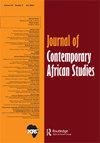提升西瓦地语作为国家语言的形象*
IF 0.8
Q2 AREA STUDIES
引用次数: 0
摘要
斯瓦蒂尼王国的统治框架和民族精神是建立在emaSwati(斯瓦蒂尼人民)的传统文化和他们的语言siSwati基础之上的。与此同时,经济上的成功与英语知识有关,英语是斯瓦蒂尼的前殖民地语言,是政府、媒体、司法和正规教育的语言。这种双语制度的一个后果是,大量英语水平有限的公民相对边缘化。虽然通过emaSwati的使用,siSwati仍然存在,但有人担心,从长远来看,英语在关键领域的主导地位可能会对siSwati的生存构成威胁。这一关切反映在斯瓦蒂尼政府最近设立的斯瓦蒂语语言委员会上。基于包容性与语言维护相关的研究,本文建议通过西斯瓦蒂语语言委员会开展的活动,提高西斯瓦蒂语在以英语为基础的emaSwati社会全球面向部门中的声望,例如制作一个来自各种类型的西斯瓦蒂语文本的标记数字语料库和基于该语料库的单语词典的项目。与津巴布韦大学的ALLEX项目建设这样的语料库并行,并鼓励将siSwati扩展到新的体裁。这些活动可能有助于提高西瓦提语的形象,使其成为一种值得与英语等更有声望的语言同样的研究和关注的语言。本文章由计算机程序翻译,如有差异,请以英文原文为准。
Raising the profile of siSwati as a national language*
ABSTRACT The governing framework and national ethos of the Kingdom of Eswatini are grounded in the traditional culture of emaSwati (the people of Eswatini) and their language, siSwati. At the same time, economic success is tied to knowledge of English, the former colonial language of Eswatini, which is the language of government, the media, the judiciary and formal education. One outcome of this type of bilingualism is the relative marginalisation of large numbers of citizens whose command of English is limited. While siSwati remains alive through its use by emaSwati, there are concerns that, in the long term, the dominance of English in key domains could pose a threat to the survival of siSwati. This concern is reflected in the recent creation of a SiSwati Language Board by the Government of Eswatini. Drawing on research that suggests that inclusivity and language maintenance are linked, this paper proposes that the prestige of siSwati be enhanced within the English-based globally-oriented sector of emaSwati society through activities undertaken by the SiSwati Language Board, such as a project to produce a tagged digital corpus of siSwati texts from a wide variety of genres and a monolingual dictionary based on this corpus, parallel to the construction of such corpora by the ALLEX project at the University of Zimbabwe, as well as encouraging the expansion of siSwati into new genres as well. Such activities could contribute to raising the profile of siSwati as a language that merits the same study and attention afforded to more prestigious languages such as English.
求助全文
通过发布文献求助,成功后即可免费获取论文全文。
去求助
来源期刊

Journal of Contemporary African Studies
AREA STUDIES-
CiteScore
2.20
自引率
0.00%
发文量
18
期刊介绍:
Journal of Contemporary African Studies (JCAS) is an interdisciplinary journal seeking to promote an African-centred scholarly understanding of societies on the continent and their location within the global political economy. Its scope extends across a wide range of social science and humanities disciplines with topics covered including, but not limited to, culture, development, education, environmental questions, gender, government, labour, land, leadership, political economy politics, social movements, sociology of knowledge and welfare. JCAS welcomes contributions reviewing general trends in the academic literature with a specific focus on debates and developments in Africa as part of a broader aim of contributing towards the development of viable communities of African scholarship. The journal publishes original research articles, book reviews, notes from the field, debates, research reports and occasional review essays. It also publishes special issues and welcomes proposals for new topics. JCAS is published four times a year, in January, April, July and October.
 求助内容:
求助内容: 应助结果提醒方式:
应助结果提醒方式:


